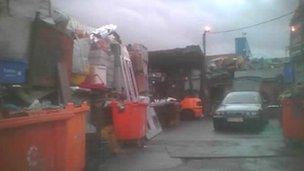Tracking down London's 'metal theft dealers'
- Published
Rogue scrap dealers willing to launder stolen metal in a trade worth millions of pounds, have been exposed in a BBC London investigation.
Figures obtained by BBC London reveal the scale of the effects of the illegal trade on rail commuters in London and the south east, with delays rising by 700% in the last three years.
Metal theft is a huge illicit business due to rising metal prices on world markets.
British Transport Police (BTP) have prioritised the problem as "second to terrorism" and there is mounting pressure to update legislation that is seen as outdated and ineffectual.
The Home Office is considering measures to tighten the regulation of scrapyards and a growing number of MPs are calling for a ban on cash transactions, which make it hard for police to track down stolen metal.
In 2009, Network Rail figures show rail operators in the South East suffered 148 hours of delays and were paid £373,799 in compensation as a direct result of metal thefts.
'No questions asked'
In 2011, this had risen to 949 hours of delays and more than £3.6m in compensation.
A former metal thief outlined the scale of the problem and how easy it was to get rid of stolen metal.
'Jim' told BBC London: "There's never any questions asked at the scrapyard, no identification asked, sign here, do what you like.
"There's certain places you take scrap metal to, you've got to build up a rapport, they don't ask no questions. They know it's stolen."
BBC London was given a large quantity of copper cable from BT, which has reported a surge in thefts, for use in an investigation.
A number of metal signs were also supplied by Westminster City Council for the operation.
Secret filming then captured scrap dealers purchasing what they assumed was illicit metal and outlining techniques to evade the police.
Secret filming
An employee of Lowes Metals of Grays, Essex, who referred to himself as Bubsy, looked at the BT cable and told an undercover researcher: "You can't touch BT, they'll lock us up straight away."
He instructed the researcher to "burn the rubber off, stretch the copper off".
Bubsy added: "The BT stuff is like doing a bank today."
The next day, after researchers followed his instructions, Bubsy purchased the cable.
"He's identified it as BT cable," said Det Sgt Chris Hearne from BTP.
Being criminal
"The fact he wants you to get rid of identification to me is showing he is acting in an inappropriate manner that is bordering on being criminal."
A second scrapyard, LT Mumford in Barking, east London, has already been the focus of enforcement agencies, with its staff receiving fines and criminal records for handling stolen metal.
The manager directed an undercover researcher to a secondary and unregistered yard.

LT Mumford scrapyard in Barking has already received fines for handling stolen metal
At this yard, the cable was processed and purchased, with the lead coating removed, along with any plastic - which could have identified it as belonging to BT
According to staff recorded secretly, this was done in order to process "hot" material, away from the glare of the authorities.
The foreman also told the researcher he was prepared to accept rail track.
Referring to labelled BT cable, he said: "Yeah, yeah, I'll have it, yeah keep it quiet.
"You can do bird (prison) over it. Better get it out, the quicker the better."
When asked to explain their actions, the owner of Lowes Metals, Alan Lowe, said: "I take responsibility, we shouldn't have done it. Bubsy did not know what he was doing."
LT Mumford Scrap Metal Merchants was approached by BBC London but has yet to respond.
Lord Henley, Home Office Minister for Crime Prevention and Anti-Social Behaviour Reduction, said: "Metal theft is a serious and growing problem and the government is working hard with police, other law enforcement agencies and industry to tackle it.
"It is clear that laws passed more than 50 years ago are no longer sufficient to deal with a crime that is increasingly dominated by organised gangs. That is why we are looking at changing the law."
All money raised from the sale of the BT cable and signs is being donated by BBC London to charity.
- Published14 December 2011
- Published29 November 2011
- Published25 November 2011
- Published16 November 2011
- Published2 November 2011
- Published1 November 2011
- Published8 October 2011
- Published3 October 2011
- Published28 September 2011